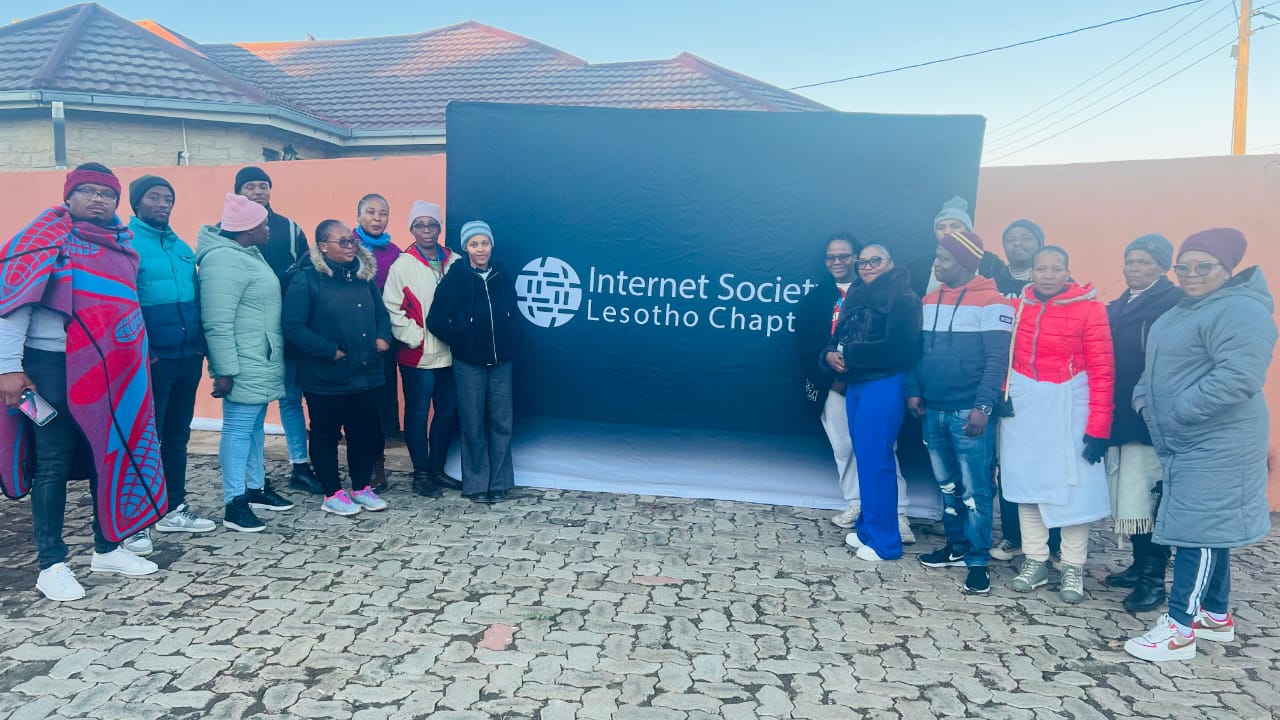
Mokhotlong – June 13, 2025
In an effort to strengthen the national response to digital gender-based violence, the Internet Society Lesotho Chapter (ISOC Lesotho) mobilised key stakeholders to take part in a pivotal engagement workshop held in Mokhotlong on June 13, 2025. The workshop focused on building collective strategies to combat Technology-Facilitated Gender-Based Violence (TFGBV), a growing issue threatening vulnerable communities in digital spaces.
ISOC Lesotho convened representatives from sectors such as law enforcement, social welfare, health, and civil society to deepen awareness on the intersection of technology and gender-based harm. The initiative also sought to enhance digital literacy and foster stronger cooperation among actors tasked with protecting human rights online.
Opening the session, ISOC Lesotho’s Secretary, Mamoqenelo Morolong underscored the importance of safe, affordable, and inclusive internet access, while highlighting the Chapter’s mission to create a digital environment that protects users’ rights. “We must ensure that our digital spaces reflect the dignity and rights we expect offline,” she said.
The workshop drew participants from institutions including the Red Cross Trafficking In Persons (TIP) Unit, Baylor College of Medicine, LANFE, Lesotho Correctional Services, LMPS, Social Workers (HIV/AIDS), and the Criminal Investigation Division (CID). Discussions focused on fundamental digital rights, ethical online behavior, the legal environment, and the specific dangers posed by TFGBV.
Morolong led a session that introduced digital rights principles, emphasizing privacy, freedom of expression, and the right to access and generate online content. She explained how digital rights are extensions of fundamental human rights and called for their protection in both policy and practice.
A lively debate followed a discussion on LMPS’s practice of publicly posting details of drinking-and-driving offenders on social media. While some attendees praised the strategy for reducing offences, others raised serious concerns over data privacy and mental health implications, especially when public comments become dehumanising. Participants agreed that while awareness is key, respect for personal data and digital dignity must remain central.
Cybersecurity experts Tšoloane Lebina and Naleli Makakane unpacked Lesotho’s legal frameworks, including the Data Protection Act, the Computer and Cybercrime Bill, the ICT Policy, and regional instruments like the Malabo Convention. Attendees were introduced to protective tools such as VPNs, DNS servers, and safe browsing apps, and were urged to implement them to secure both institutional and personal digital infrastructure.
On the same note, Seabata Makoae, the project’s Lead Facilitator, led an eye-opening session on TFGBV, identifying its various forms such as cyberstalking, sextortion, impersonation, and revenge pornography amongst others that people should be aware of. He highlighted how digital violence often mirrors offline gendered patterns, disproportionately affecting women, youth, and LGBTQI+ individuals. “We are seeing victims as young as nine years old,” he said. “This is not just about technology, it’s about power, norms, and accountability.”
Stakeholders were also invited to share challenges from their respective sectors. LMPS officers expressed frustration over the current legal limitations, noting that digital evidence is often not admissible in court. Others shared that limited skills and resources, as well as resistance to implementing safety measures, hinder effective response to digital threats. Baylor representatives on the other hand noted of how their landline number had been exploited in scam calls, revealing how institutions remain vulnerable to cyber-attacks, these being some of the typical security threats experienced.
The workshop served as an opportunity for reflection and learning. Several participants acknowledged a shift in perspective, recognising the importance of digital safety protocols they once saw as cumbersome. The sessions helped reinforce the need for all sectors to act proactively in safeguarding digital spaces.
ISOC Lesotho emphasised the importance of collective responsibility, urging institutions to begin by protecting their own digital environments before extending support to communities. The workshop closed with renewed commitment to collaboration, policy development, and ongoing stakeholder engagement.
In Lesotho, 36% of women have faced violence from a current, recent, or intimate partner, according to the 2023–24 Lesotho Demographic and Health Survey. A Commonwealth study also found that the country spends over 5% of its GDP on addressing Gender-Based Violence. “This figure excludes personal costs borne by survivors—most of whom are women and girls. An emerging and largely overlooked form of violence is Technology Facilitated Gender-Based Violence (TFGBV), which remains under-reported and under-researched” ISOC Lesotho pointed.
As digital technology becomes more embedded in daily life, this initiative marked a critical step in ensuring it is used to protect and empower, not harm. The Internet Society Lesotho Chapter reaffirmed its commitment to mobilising resources and partnerships to build a digital ecosystem that is safe, respectful, and inclusive for all.





